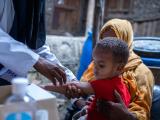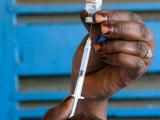Dec 10, 2002 (CIDRAP News) Thirty-eight of 62 US states, territories, and major urban areas have filed "pre-event" smallpox vaccination plans with the Centers for Disease Control and Prevention (CDC) as of today. The plans for vaccinating key public health and healthcare personnel were due to the CDC yesterday.
"Right now there are 38" plans in, CDC spokesman Curtis Allen in Atlanta told CIDRAP News today. "There may be some still in the mail." He said a few jurisdictions have requested and been granted extensions of a few days to a week.
Yesterday's deadline came one week after a Dec 2 deadline for states to submit plans for vaccination campaigns in response to a smallpox outbreak (post-event plans). The states had been working on those plans for several months. On Nov 22, little more than a week before the deadline, the CDC asked the states to supplement those plans with plans for pre-event vaccination of public health and healthcare workers who could be called on to respond to a smallpox outbreak. The latter move apparently resulted from a determination that those who would vaccinate people in response to a smallpox outbreak should get their own inoculations before any outbreak occurs.
A presidential announcement on the scope and pace of a smallpox vaccination program has been awaited since late September. In October the federal Advisory Committee on Immunization Practices (ACIP) recommended that certain groups of hospital staff members who could be called on to care for smallpox patients be vaccinated preemptively; the committee estimated that number at roughly 510,000 nationwide.
In its Nov 22 notice calling for pre-event vaccination plans, the CDC stated that "Immunization operations should be completed within 30 days of the program's announced start date." Allen said he understood that to mean 30 days from when a state actually launches a vaccination program, not 30 days after a presidential announcement. "That time frame would change depending on what the president announces," he said. "That timing is for planning purposes only."
The Nov 22 notice also said the CDC would review each pre-event vaccination plan within 48 hours of receiving it and either certify the plan as complete or ask the state for additional information.
The CDC instructed the states to make plans to establish smallpox public health response teams, hospital smallpox response teams, and vaccination clinics, and to develop plans for scheduling vaccinations of the response teams. The states are also expected to estimate how many response teams, participating hospitals, and vaccination clinics will be needed.
So far, reports from around the nation indicate that the state pre-event plans vary widely in how many healthcare and emergency workers will be vaccinated. The Associated Press reported that Georgia plans to offer the vaccine to 300 to 500 people, while Michigan would offer it to 5,000 to 7,000. Some other numbers cited include 20,000 in Louisiana, 70,000 in California, 5,000 to 10,000 in Minnesota, and 10,000 in Massachusetts.
Minnesota's pre-event plan, according to information on the Minnesota Department of Health Web site, says shots will be offered to patient-care teams in hospitals equipped to take smallpox patients, disease investigation teams, healthcare workers who would vaccinate others after an outbreak, certain other key public health workers, and "a limited number of critical emergency management and law enforcement personnel." Buddy Ferguson, a spokesman for the health department, stressed that the vaccination program would be "completely voluntary."
A major question hanging over the vaccination planning is how many of the people who are offered the vaccine will actually take it, given the risk of serious side effects and the unknown risk of a bioterrorist attack involving smallpox. "I don't think we really know the answer to that question," said Ferguson. The Baltimore Sun reported recently that in a survey of emergency-department nurses at Bellevue Hospital in New York City, half were willing to be vaccinated, 11% were unwilling, and the rest were undecided.
The Service Employees International Union, which includes many healthcare workers, has expressed concern about vaccine-related risks. According to a New York Times report today, the union's president said yesterday that workers should not be punished if they refuse vaccination and should not lose pay if they have to stay home because of vaccine side effects. The union also said the government needs to educate healthcare workers and the public to prevent vaccination of people who have risk factors (such as HIV) for serious reactions.


















